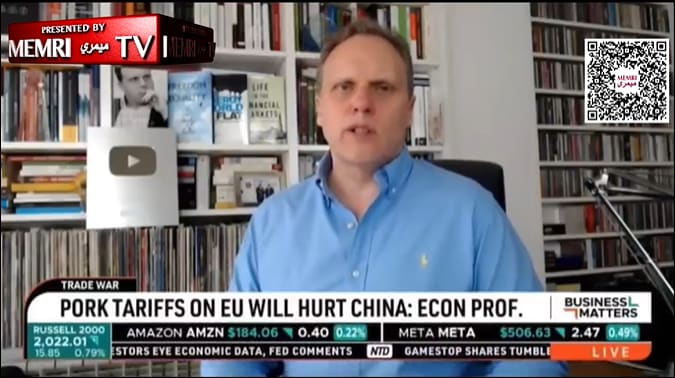
Prominent Spanish economist Daniel Lacalle, who is a member of MEMRI's Board of Advisors, said in an interview that was posted to his YouTube channel on June 23, 2024 that China is facing the largest real estate bubble in recent history and that economic history throughout the globe indicates that China's economy is certain to falter. He said that Chinese economic officials can improve the long-term outcome by choosing to embrace a "day of reckoning" and reducing housing prices to match the economic reality, rather than keeping prices elevated and failing to address the problem.
Interviewer: "So, Daniel, I do see you talking a little bit about China on social media and I think you can speak to this, as well, as it is big news today. So, China's new home prices are falling at the fastest pace in nearly ten years. Can you talk a little bit about that? What options do Chinese officials have at the moment?"
Daniel Lacalle: "Well, I think that it's going to be very, very difficult for them to accept it. But, Chinese officials need to understand that they have only one way of addressing the largest real estate bubble in recent history. It's larger than the real estate bubble of Sweden, of Spain, the United States, the UK, in relative terms. So, the burst of the real estate bubble in China needs to see deflation in prices. There is only one way in which you can deal with it, which is by actually making homes significantly more affordable for Chinese citizens in order to absorb part of that excess building which has been absolutely staggering.

"Now, if Chinese officials, in order to combat deflation, decide to implement measures to keep prices elevated or unaffordable for the majority of people, then two things happen. We have seen it in Spain. We have seen it in Sweden. We have seen it in Iceland. Two things happen: One, is that the excess of supply of homes is not reduced. Second, is that economy enters into weakness regardless. So, there's only one way in which you can deal with a real estate bubble burst, which is by accepting that the prices of homes as they were being put to the market was completely, completely, different from... and significantly higher than what the reality would accept.
"And if they tried to bring home prices up, that is not going to work. It never works. The only way in which you deal with it is the way that the United States... you'll need foreclosures, you'll need to see write-offs of real-estate portfolios in the banking sector. All of those things need to happen. So, you need to have, let's say, the reckoning moment of lower home prices and then, maybe, you start to recover."
Interviewer: "Okay, so I think that the fear here, and correct me if I'm wrong, is that because real estate for China is a big contributor to economic growth to GDP, so I mean, I guess officials don't want really want prices to come down because of that factor. But, you're saying that China is likely to see economic slowdown anyways. So, why do you say that?"
Lacalle: "Well, because it's inevitable. We have seen so many real estate bubbles in so many countries that we now have enough information to understand that growth in GDP with a real estate bubble creates very significant imbalances that always come back to bite. So, if I was a Chinese official, I would look at these from a 'glass half-full' way, which would be: 'Hey, look, yes, we have this massive problem in the real estate sector, but the economy is still going to grow four percent.'
"If they look at it from the perspective: 'We don't want prices to come down. We want prices to stay where they are, and continue to build as much as we did in order to continue to have the level of GDP growth as we did that the provinces demand, etcetera, etcetera...' Then, you don't solve the problem of a real estate bubble and you don't get the benefits that could make more people access a home. So, a real estate bubble... no government wants to acknowledge a real estate bubble because it makes it... it shows that the policy implemented to maintain GDP, or to increase GDP, to get more tax revenues with rising home prices, failed.
"Okay, fair enough. But if you think about it from a perspective of the real economy, they should see that there is no positive way in which you can solve the negatives of a real estate challenge if you don't allow the market prices to adjust to reality."
Interviewer: "So, let me just ask one more question here, Daniel. If Chinese officials fall down the path that you have suggested, there could be some potentially serious, maybe, economic pain in the near term?"
Lacalle: "Absolutely. Absolutely. There is no other way to address a real estate challenge of this magnitude, in no economy. There are no measures that can be taken to address such an important real estate challenge after such a large increase in imbalances in the housing sector. And it's a day of reckoning. It happened in Sweden. It's happened in the UK. It happened in the United States. It happened in so many economies. Absolutely. There will be economic pain, but the way to look at it is that, this is the most important part, that there is no other way to address it. There is no other... If you try to keep home prices at a level that is justified to economic reality, you don't address the problem in the real estate sector and the economy suffers, anyhow."













